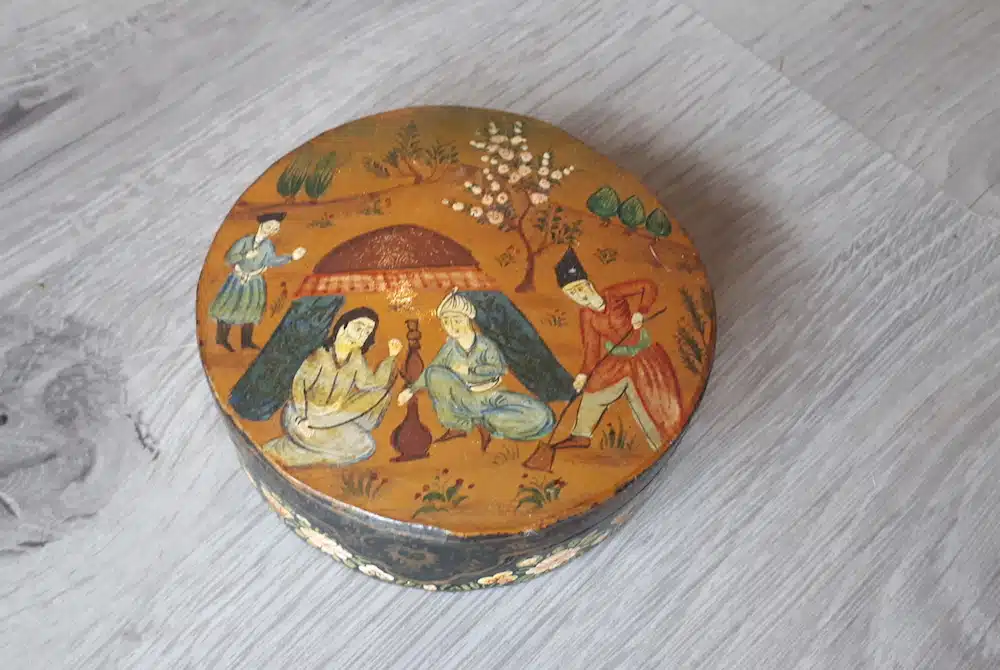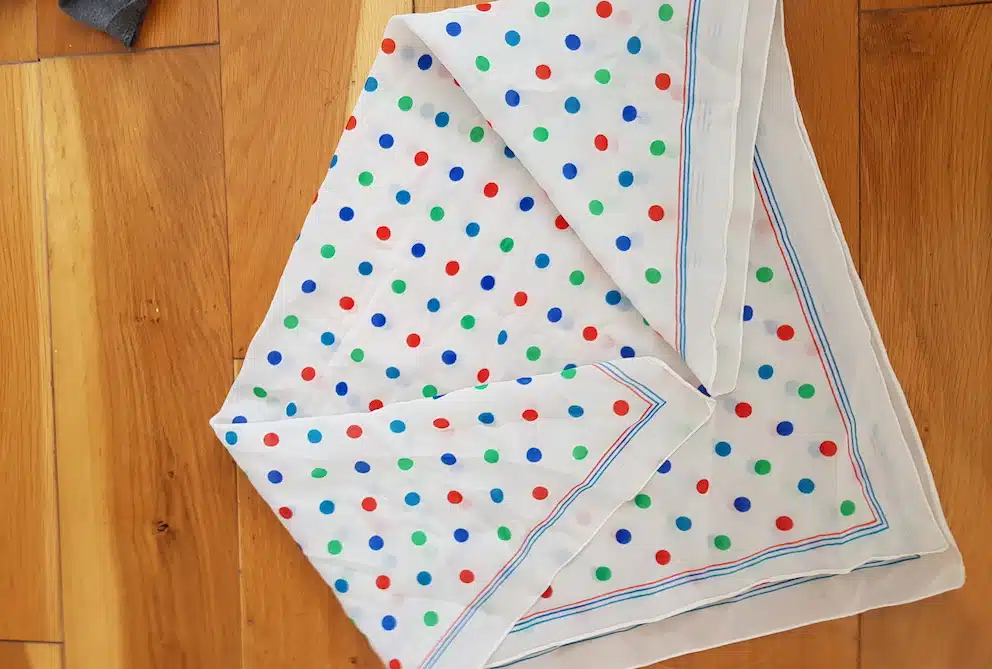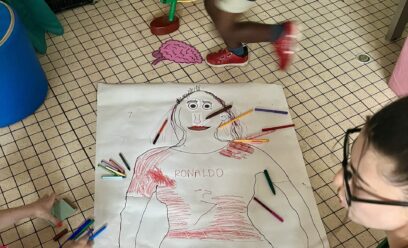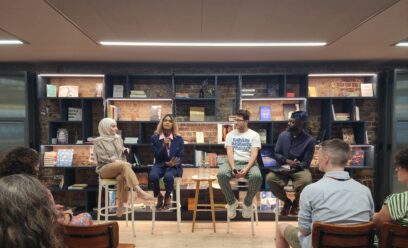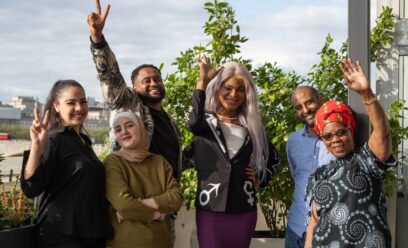‘I felt a hole in my chest the whole two years we were separated.’
Posted by IMIX on July 9, 2021Leila Zadeh, Executive Director of Rainbow Migration was forced to flee Iran with her family when she was just a baby. Here, the whole family tell the story of their dramatic journey to safety.
Hossein (Leila’s Father)
I was writing about the revolution and the authorities in Iran. Then there was an exposé of me in a semi-official newspaper. Members of my family had been arrested so I had to go into hiding and later on leave Iran. I left illegally through the mountains in the Kurdistan region on horses and by walking.
We were a group of five men led by two local guides. It was wintertime and snow covered the mountains. It took us about three days to get to the Turkish border. The journey was filled with danger, but we managed to make it through without being spotted by revolutionary guards or local agents. Once we got to a village, I saw in the living room a portrait of the then-president of Turkey. I realised we had left Iran and felt so relieved. We had got to Turkey illegally so were detained for several weeks in a local town near the border, until they let us go to Istanbul and travel through to Frankfurt. Then I found my way to the UK where my wife and I had been students before. Somaye and Azadeh were born here, so we already had some connections.”
Fathieh (Leila’s mother)
When Hossein left, I was in Iran with my three daughters and the situation got difficult for us. Our friends and relatives were arrested. We had to go into hiding. Circumstances were changing for women and girls in Iran. I thought that my girls wouldn’t have a good future there.
I left with two other families. We were in a van and had to hide ourselves with sheets every time we passed a checkpoint. One of the children from another family was ill, she was crying every time we went under the sheet and reached the checkpoint. Leila was about one year old and I had to put my hand over her mouth at the checkpoints to make sure she didn’t scream.
We arrived in a village in Kurdistan at dusk. Someone had reported us to the revolutionary guard, so we tried to leave on horseback. It was rainy and muddy, it was a horrendous night. The revolutionary guards attacked us, they started shooting. We couldn’t see them it was so dark. The horses started running around and we fell off them. In that dark and rain we lost each other. I was worried Leila might have been injured but I found her wrapped up and asleep. I found Somaye my oldest one – but Azadeh, my second one, was lost.
We couldn’t leave that night because our guides ran away from the guards and the villagers didn’t want us in their houses. They said the guards would come and kill them.
We stayed near the river on the mud, holding the kids on our bodies so they wouldn’t get wet. The next morning, we had no food or breakfast. I had to give the baby, Leila, her bottle, but there was no water. So I filled the bottle with dirty river water and made some milk. I didn’t know if she would survive but she drank it and wasn’t ill surprisingly.
We had to leave without Azadeh and three other children. We didn’t know what had happened to them. I knew that Azadeh’s horse had been shot dead and was so scared that she might have been hurt. But the Kurdish people who we met whilst still inside Iran brought us the news on the journey that Azadeh and everyone else had been taken to prison. I was so relieved that she hadn’t been injured.
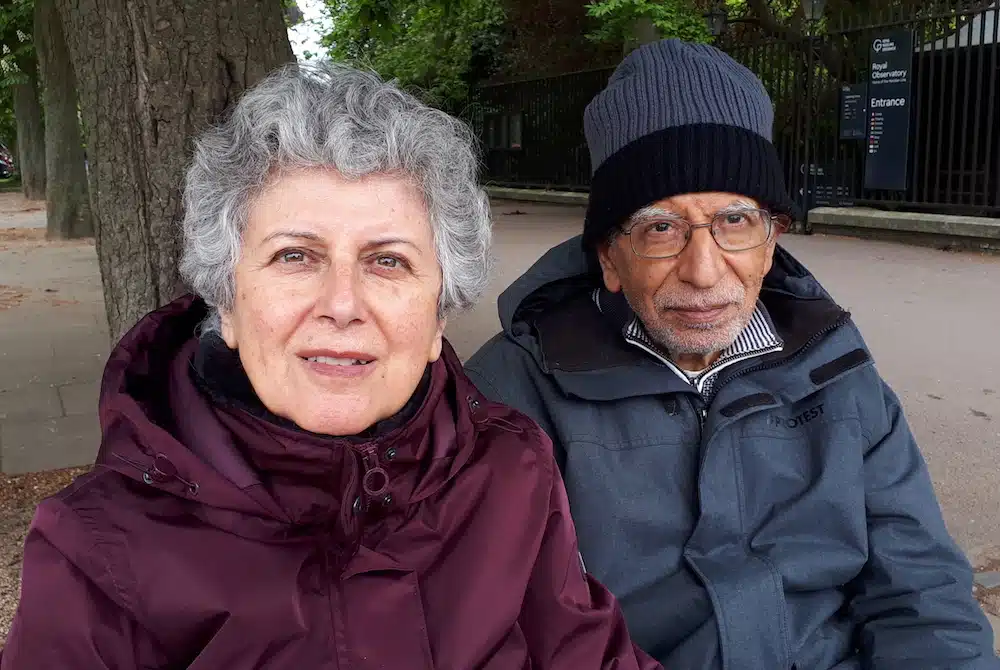
Fathieh and Hossein
Azadeh (Leila’s sister)
It was very scary when we first got caught. I was nine years old. We didn’t have any news of the rest of the families. In the prison, we were all in a cell and let out for fresh air for a short time each day. There were other kids there, so we played together. Every so often they would bring us in and ask questions like, ‘Where are your parents?’. They would say they didn’t want to do anything with them and just wanted to know they were safe. I knew they were lying. Even if we knew what had happened to them, we wouldn’t have said.
The thing that kept me going was the hope of being reunited with my family.
After 20 days, our grandparents came for us and took us back to their homes. Then we learnt the others hadn’t been caught. I lived with my grandparents for two years until they could get me a passport and safely get me out of the country.
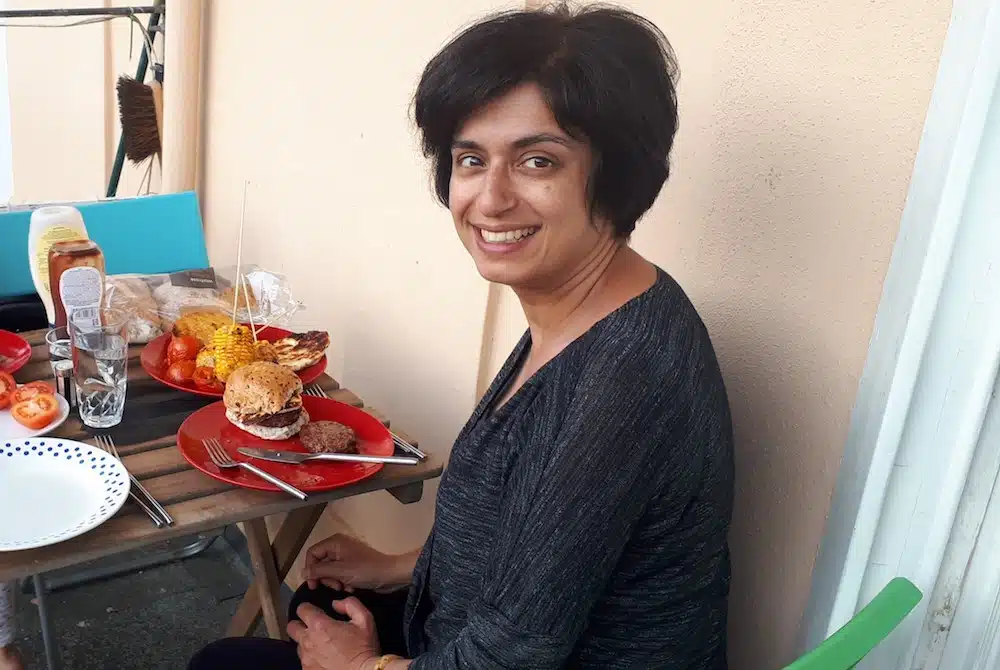
Azadeh
Fathieh
One sad thing I will never forget. When we set off through the mountains to try and escape the checkpoints, we had nothing to eat or drink, there was no water anywhere. We got to the top of the mountains. It was full of lovely wild flowers. We found a little water there. I went down and used the top of the baby bottle and filled it with water and gave it to the children who were really thirsty. I was making cereal for Leila and all the kids wanted to have it. They were so hungry. I mixed the water with the last of the cereal in a little bag and each one had about half a cup just to taste and that was their lunch.
Hossein
That couple of weeks was very difficult because we didn’t have contact, we didn’t know what was happening.
Fathieh
During our journey to Turkey through the mountains, we lost our luggage. I think it was stolen. In that luggage was Leila’s bottle. I was crying my eyes out saying, ‘How can I feed her? What can I do?’ One of the villagers got me one of those tiny, primitive baby bottles. I was so thankful. I said, ‘Whenever I come back, I will come and repay all your kindness’. But we never went back and I don’t know what happened to them. That I kept and still have.
Somaye (Leila’s sister)
I’ve written a song about an imaginary child refugee in today’s world. A lot of the themes come from our experience such as the sense of loss and separation from family members.
I was feeling very, very scared the whole way through. I was just a child. I couldn’t do anything. We just wanted to survive.
Fathieh
It took us about ten days to get to Turkey. When we got to there, we heard the children had been given to our parents. Life there was hard but eventually I got a visa from the British embassy to come to the UK.
All the time, I just had hope for better days.
I had heard this expression that parents separated from their children or who’ve lost them feel a hole in their chest. I physically felt a hole in my chest for that whole two years when Azadeh was separated from us – and when we were reunited, it wasn’t there.
Hossein
Coming to the UK directly was difficult so Azadeh went to Paris. I went there and picked her up. When we met at the airport, I looked at her and said, ‘I am your Dad’. She looked a bit bewildered.
Fathieh
When I was reunited with Azadeh, she crawled up me and smelled my neck. She said, ‘You smell the same as you did two years ago when we were together.’
Leila
I remember meeting Azadeh. You were wearing the veil.
Azadeh
It was nice to come and see the family but I had forgotten my English so I had to remind myself of that again and slowly get rid of my headscarf. It was a bit of a shock not to wear that anymore.
Leila
You brought me presents when you unpacked your suitcase. I have this little Iranian pot from you.
Azadeh
I still have a spotty headscarf I brought from Iran with me.
Fathieh
You were wearing it when you came, you were wearing it your first week at school.
Somaye
When we first arrived my Mum and my Dad used to say that we are going back to Iran very soon. They believed that everything was going to change. They used to ask us kids, ‘Who wants to go back to Iran?’ And we would all stick our hands up.
Leila
None of us has ever gone back as we still can’t, even me.
Fathieh
You always miss your home country, whether you are living in a hut or a castle, your home is your home, your family and friends.
Somaye
Like Azadeh I had to relearn English although it came back fairly quickly. I felt like I didn’t fit in. I missed my relatives, not just my sister, but everyone. In Iran we had over 25 cousins. There were always kids around to play with and when we came here it just felt lonely.
Fathieh
You missed Azadeh a lot, you were very quiet when you came back from school, you went straight to bed and hid.
Hossein
Once everyone had got here without being harmed, I felt relieved. Life in Iran was getting more difficult. You had to conform with the system or else you would be in trouble.
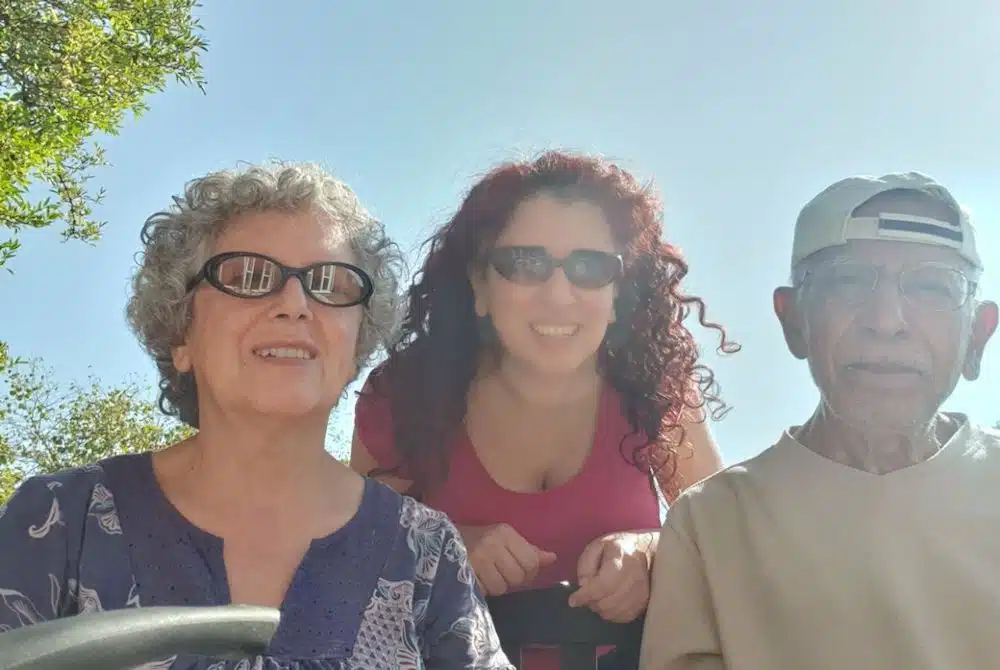
Fathieh, Somaye and Hossein
Fathieh
I had started to do my MSc but I couldn’t continue because of the situation in Iran. Hossein’s brother and sister were arrested. Thinking about all of that wasn’t easy when I went to college. I learnt whatever they said but as soon as I closed my books, I forgot everything.
Somaye
What helped me get through this period was that I started learning to play the piano and taking up music. I really enjoyed it and it gave me something to focus on. I didn’t realise it at the time but emotionally it helped me a lot.
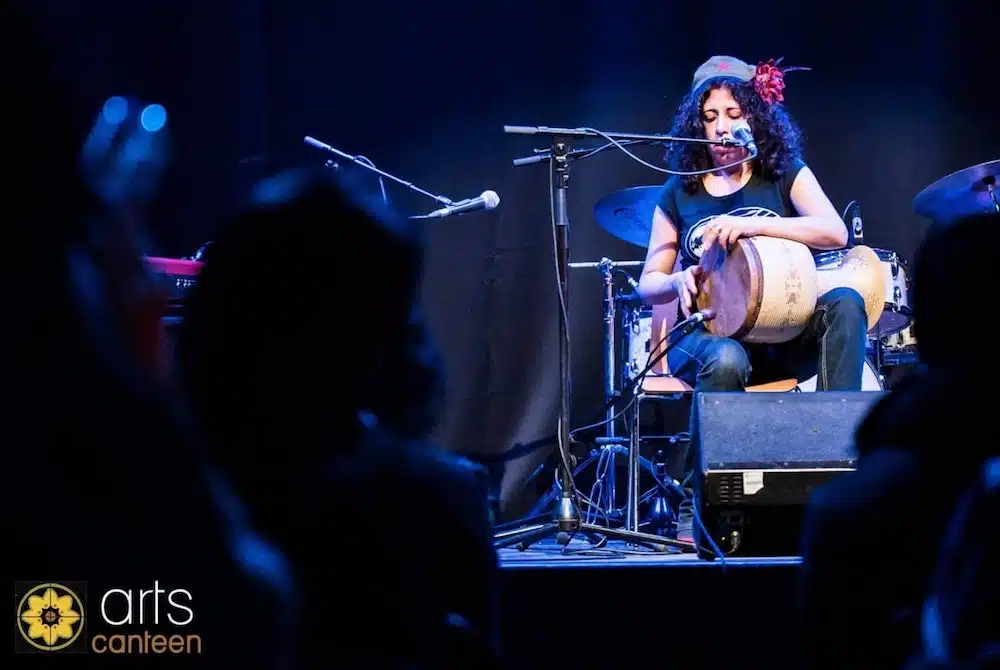
Somaye playing at Rich Mix in London, 2015
Fathieh
The freedom here especially for women made a difference. We started publishing a feminist journal with other women featuring news and stories about Iran. We couldn’t do anything like that in Iran.
Leila
It’s a superhuman story. Sometimes it’s hard to really digest and take in, that your mother, father and sisters went through this. There is a lot of pain and trauma but my experience of growing up was mostly like a normal family. We don’t talk about this everyday but whenever something comes up it is always a bit of a shock that this happened to my mum, dad and sisters.
Somaye
It happened to you too, you just don’t remember. It had an effect on you. When Mum told us we need to go into hiding, we were all panicking and packing. You were a baby, crawling around and crying, realising something was wrong. Then on the journey, you were not happy. I remember you crying a lot when we were on horse-back.
Leila
There was always a feeling throughout my childhood that we had to be careful even in the UK, that somebody could be watching us. And we would still receive news about arrests, torture and executions of extended family members and friends.
Fathieh
I follow what is going on in Iran. I still have sisters and family there, who we would like to visit once in our lifetime before we die.
Leila
My parents have always been human rights and political activists even before they were directly persecuted. As a child I knew that my mum went through an horrific journey to come here with me and my sisters and that I needed to do something with my life as a result of that. An investment had been made in protecting me and my sisters. I definitely took inspiration from that.
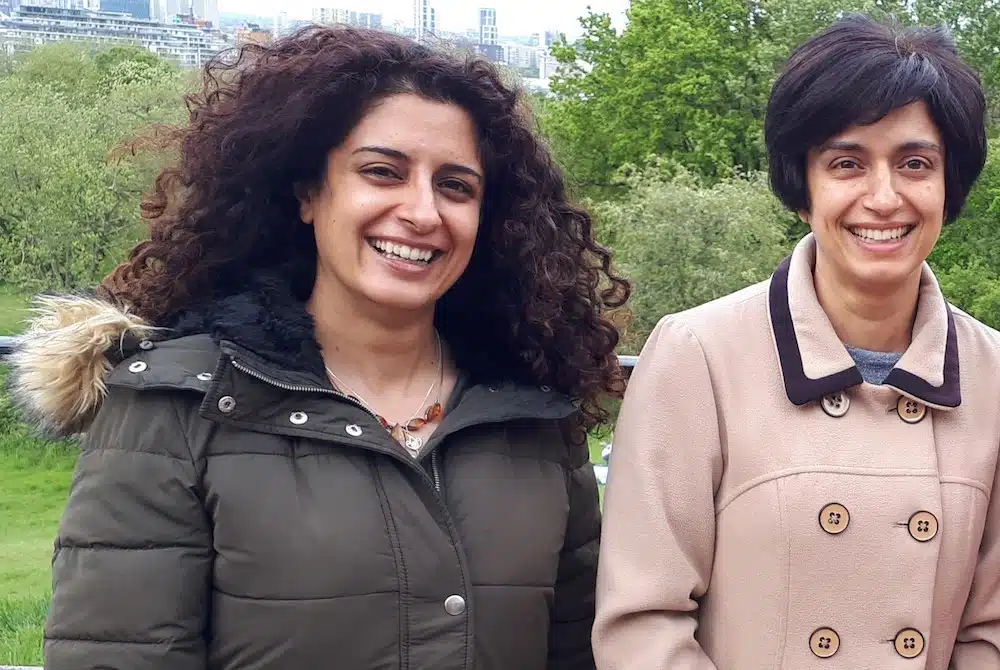
Leila and Azadeh
Fathieh
I was empowered by the whole experience leaving Iran with three children. Although I couldn’t work in my own field of education, I still managed to get good jobs with the Refugee Council and Women’s Aid. I feel part of the British community, I have British friends. I feel British, it feels good. I believe people, especially women, can do whatever they want to achieve.
Leila Zadeh is Executive Director of Rainbow Migration who provide emotional and practical support, and legal advice to help LGBTQI+ people applying for asylum in the UK so that they can rebuild their lives. More information on how you can support their work can be found here.


